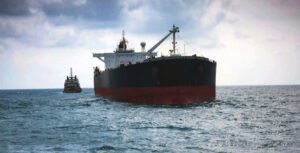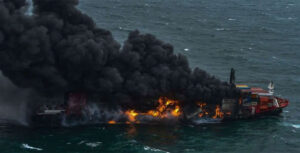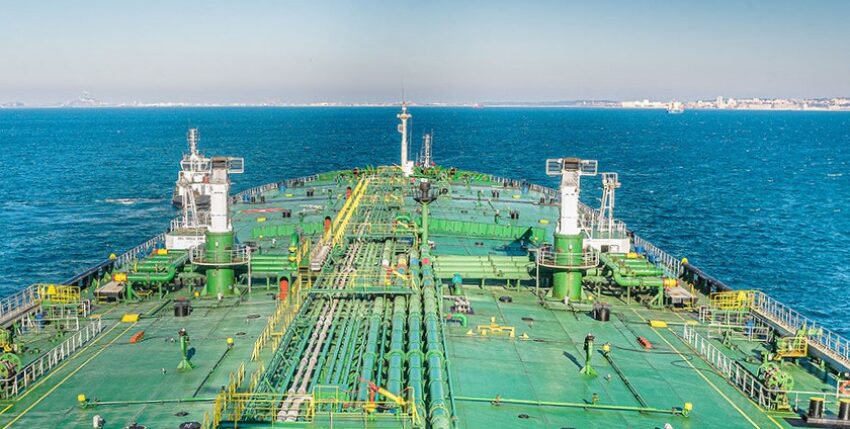Under the title "Ships Are Flying False Flags to Dodge Sanctions", an article by the columnist appeared on 30 January 2023 Elisabeth Braw in "Foreign Policy" magazinewhose most important statements are summarised here.
Property - Register - Flag
Elisabeth Braw begins by noting that ship ownership in the world is unevenly distributed among countries: the three countries with the largest shipping companies are China, Greece and Japan. But none of these countries are among the top countries under whose flags all these ships actually sail! The fourth-placed United States and fifth-placed Germany are not among them either.
Flag of Convenience
The flag states are led by Panama, Liberia and the Marshall Islands. As economically weak countries, they offer owners the opportunity to register their ships for a much lower fee than would be possible in industrialised countries - hence the term "flag of convenience states". However, this also means less service and significantly fewer inspections. The former has made the flag-of-convenience states popular with countless ship owners in recent decades for cost reasons. The latter now makes them extremely attractive for ships that want to circumvent Western sanctions against Russia. According to Foreign Policy, a number of ships have switched to the flag of convenience states, in some cases without notifying the state. This is often not even noticed in the small maritime states with overstretched administrations because there is a lack of personnel and resources to recognise so-called illegal "flag squatters" and take measures against them. Instead, sea trawlers, which should actually be on their way directly to be scrapped, roam the world's oceans. They bring oil from Russia and the two other sanctioned countries, Venezuela and Iran, primarily to China, but also to other customers. And nobody does anything about it - until disaster strikes!
Flagging out
Michelle Wiese Bockmann, maritime traffic analyst at Lloyd's List Intelligence, London, explained to "Foreign Policy" how this works.
In order to circumvent sanctions, shipping companies turn to small, privately administered flag registers and misleadingly state that their ships are now flagged there, knowing or suspecting that the country will do nothing about it.
Or they flag the ships there legally and get the country to issue false IMO company numbers, because every shipping company has an identification number with the International Maritime Organisation.
Another variant is that a shipping company or a ship that does not want to be recognised while underway cheats the register of a flag state by providing fake IMO numbers when registering. And since the shipping registers of flag states of convenience are often poorly staffed or privately administered - perhaps even both - officials and employees rarely spend serious time verifying IMO numbers. And shipping companies operating under false IMO numbers are very difficult to track down.
In the beginning was Iran
It is also noted that flagging out to circumvent sanctions has been going on for about a decade. At that time, the Iranian state oil company realised that it could circumvent restrictions on its oil by registering the ships of its shipping companies in the double register maintained by Tanzania and Zanzibar. This curiosity dates back to the time when Zanzibar was independent and not yet part of Tanzania. Although the "parking" of Iranian tankers in the double register was not entirely legitimate, it was done with the knowledge of the private company that administered the register. And so Iran managed to continue exporting enough oil without calling it oil, because a flag of convenience state is rarely interested in the cargo of the ships. And since there is no international shipping authority in the world that can track every single ship, especially if it tries to disguise its flag registration by changing it from time to time, sanctions that have been painstakingly won are happily "circumvented"!

Russia follows suit
Iran started it, Venezuela copied it - and it turned out to be the perfect template for Russia. Today, "flag hopping" is the hottest trend. Even low-paying newcomers are welcome in Tanzania, Samoa, Nauru, Belize, the Cook Islands, Gabon, Palau, Kiribati, St Kitts and Nevis, Sierra Leone, Cameroon, Guyana, Comoros, São Tomé and Príncipe and Micronesia.
Profit and risk
Enormous quantities of sanctioned crude oil from Iran, Venezuela and Russia - an estimated 2 million barrels - leave the terminals every day on board mysterious tankers flying the flags of ignorant or inattentive flag-of-convenience states.
Most of the tankers are destined for China, which means China is single-handedly undermining some of the West's toughest sanctions against Russia, concludes Elisabeth Braw of Foreign Policy. "Shipping companies' tactics have evolved as US foreign policy has changed," said Bockmann at Lloyds. "Shipowners are making billions of dollars transporting this oil and are willing to take the risk."
Morality and accountability
China has not yet been held accountable by the United States. In that case, Beijing would argue that it is not obliged to comply with US sanctions against Russia, Iran, Venezuela or any other country. And neither the IMO nor any other authority seems keen to really clean up the shop. An IMO legal committee is investigating the problem, but its report is not expected until next year.
Dangers without protection
The author believes that the already fragile system of ship registration is on the verge of collapse due to the current and targeted circumvention of sanctions. This makes the world's shipping routes a dangerous place to be. This is because the tankers transporting sanctioned oil to China and other customers include dozens of decommissioned Very Large Crude Carriers (VLCCs). Like all other tankers carrying sanctioned oil, these ships are unable to take out the insurance that would normally be mandatory for such critical shipments.
Insurance without value
Fittingly, the governments of Russia and Iran are now offering such tankers their own insurance policies. They are doing this because they are already actively affected by sanctions and do not have to worry about further penalties. This is in stark contrast to Western insurers, who can be held massively accountable by their own governments if they are found to be in breach of sanctions.
Once the reputation is ruined
According to Bockmann, bogus insurers have already emerged who issue completely genuine-looking certificates that are accepted by harbour inspectors without hesitation - but are of course not worth a penny. But the registry offices, which are suddenly being approached by a whole host of new customers, both known and unknown, also seem to have little interest in cleaning up their act - mainly because a lot of money is changing hands, both commercially and probably personally.
An example
"Foreign Policy" reports an example of this: last October, the VLCC "Saint Light", formerly known as "Young Yong", ran aground off the coast of Indonesia. It turned out that the Djibouti-flagged tanker was actually connected to a Ukrainian trader who had made a name for himself smuggling Venezuelan and Iranian oil. The accident and the origin of the "Saint Light" became such an embarrassment that Djibouti unceremoniously unflagged the tanker. Today, the "hypocritical" giant tanker is registered in Barbados, where one only receives dismissive answers to specific enquiries.
Tanker queue in front of the Bosporus
Even before Christmas, the EU sanctions meant that oil from Russian ports - even if it was Kazakh oil exported via Russian Black Sea ports - was only allowed to leave the sea via the Bosporus if it was purchased for less than 60 dollars a barrel and insured against risks and hazards with a European insurer. Due to the unclear situation, Ankara insisted on corresponding written documents from the insurers, which led to waiting times of several days and a traffic jam of over 20 tankers with at least 18 million barrels of crude oil before leaving the Black Sea. Although the cargoes were destined for destinations all over the world, most of them were destined for Europe, where Russian oil was about to be blocked but Kazakh oil was allowed to be landed - even if it came via Novorossiysk. The congestion cleared up, but the situation is a stark reminder of the current uncertainty in maritime freight transport.
Crews as victims
The lawless tankers are driven by crews of up to 30 people who also live in a legal no man's land at sea. If something happens to them, the flag of convenience state will not come to their aid. Bockmann concludes that the situation is now so deadlocked that "the only thing that could prompt anyone to act is the enormous crisis of a massive oil spill".

Rescue - by disaster or amateurs?
Elisabeth Braw assumes that an oil spill involving a sanction-breaking tanker would be even worse than the Exxon Valdez disaster itself: There would be no insurer in this case, nor would there be a flag state that could absorb some of the damage. The world's best hope, Bockmann appealed, was that the growing number of open source intelligence enthusiasts would continue to diligently track mysterious fleets. In recent years, open source researchers - from employees of affected companies to amateur detectives - have generated enormous knowledge about all kinds of shady activities by carefully monitoring easily accessible open sources. Just as they would have regularly tracked the activities of Russian units in the theatres of war in Ukraine, for example, far more of them should now be turning their expert eyes to the tens of thousands of ships plying the world's oceans, especially those that were behaving strangely. The 300 tankers tracked down by Bockmann at Lloyds List Intelligence are probably just the beginning in this matter.
Sources: Bloomberg, Foreign Policy, gCaptain, Hansa, Maritime Executive, Neue Züricher Zeitung
Background
The Ship register like a land register on land, provides information about Ownership and legal relationships with regard to the registered ships, which are then also authorised or obliged to fly the flag of the "flag state". In accordance with Art. 91 of the UN Convention on the Law of the Sea (part of the International Law of the Sea) ships have the nationality of the state whose flag they are authorised to fly. This means that the legal system of the flag state applies to these ships. On the high seas, they are subject to the exclusive jurisdiction of that state, but do not form part of its National territory. (Wikipedia)
The following must be distinguished from official registers Classification societies such as Bureau Veritas,Lloyd's Register of Shipping, DNV GLas well as American Bureau of Shipping or Registro Italiano Navale, which are at technical testing organisationswhich monitor compliance with standards and norms as well as official requirements in the construction and operation of ships. (Wikipedia)







